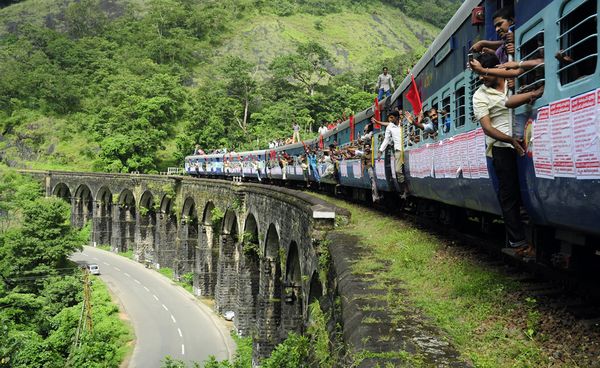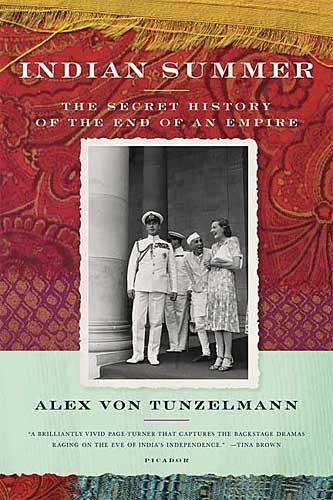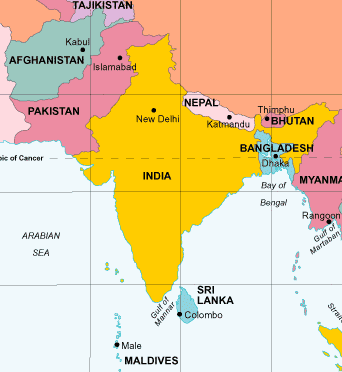A tragedy in South Asia, 1947: Part 1 of reflections on Indian Summer
 I am endlessly fascinated by India. I fueled the flames in college while earning my minor in Asian studies, and my last semester in school, having finished already with my senior thesis, I relaxed by taking a double dose of India: South Asian politics and Modern India history classes, right alongside each other. It was pure heaven.
I am endlessly fascinated by India. I fueled the flames in college while earning my minor in Asian studies, and my last semester in school, having finished already with my senior thesis, I relaxed by taking a double dose of India: South Asian politics and Modern India history classes, right alongside each other. It was pure heaven.
It's funny to have such a relationship with a place I've never been; nor am I of Indian descent. It's the color, the diversity, the charm, the immensely compelling history of the vast subcontinent. There is such massive human joy and suffering, simultaneously living in South Asia (which comprises India, Pakistan, Bangladesh, and Sri Lanka roughly, for the purposes of my discussion here). I've written about it before, and in fact I have a journal that I kept for my Modern India class that is full of my musings about all things culture, history, religion, people, language, war, peace, hate, love, and the enigma that is India.

This background with the region is probably why I plowed through Indian Summer: The Secret History of the End of an Empire by Alex Von Tunzelmann. First, the author conquered my number one complaint about history books: most historians aren't great writers. They let all their grammar and style seams show in an effort to ensure the accuracy and professionalism of their historical argument. I am not saying that you should neglect your accuracy in order to write a more compelling story--they are of equal import. But so much history is somehow sapped of its drama and it-s page-turning nature by bad storytellers wearing their scholarly caps. Von Tunzelmann has written a seriously great story, maintaining the intrigue and mystery and human nature that are all there in the pages and documents that recount the last days of the British Empire, as it voluntarily gave up India in 1947.
Americans, not having been much a part of the British Raj and the whole mess of stuff that was happening in India, don't know veyr much in general about this era of the Indian subcontinent's past. Considering Pakistan is one of the most significant countries on our foreign policy plate today, we absolutely should be more aware of the history of this young nation. It is the country that almost wasn't, arguably probably should not have been, and the partitioning that did occur in 1947, as the British prepared to leave the region, wrecked havoc on millions of lives.
I always remember my South Asian politics professor, who shared her family's experience during partition: her parents were from Lahore (which is in modern-day Pakistan) and they were married and left for their honeymoon in Kashmir around the middle of August in 1947 -- exactly when India and Pakistan were to become two new, separate nations from one another. The problem was that British and Indian officials waited as long as they could to publish the new, rather arbitrary and constantly-argued borders between the countries, because they knew there would be violence and havoc. So Prof. Bhasin's parents, suddenly found their hometown across the border, in Pakistan, while they were now in India. They couldn't return; thousands of people were being murdered and hundreds of thousands were crossing the border from one to the other, and returning at the time would have meant almost certain death, rape, robbery, or all three. They never returned, and now live in Mumbai.
 Partition was first proposed by those Muslim politicians and leaders in Hindu-majority India who felt they would never be properly represented as a religious minority; there are several historical arguments about how serious a proposition this even was; by the mid 1940s, many people, including the British Viceroy of India, Dickie Mountbatten, agreed that this plan, if it were executed, would unquestionably bring violence and further calcify the divide between Hindus and Muslims in the region--especially those who decided to stay in their present homes, even if it meant they were now a Hindu living in Muslim-majority Pakistan, for example.
Partition was first proposed by those Muslim politicians and leaders in Hindu-majority India who felt they would never be properly represented as a religious minority; there are several historical arguments about how serious a proposition this even was; by the mid 1940s, many people, including the British Viceroy of India, Dickie Mountbatten, agreed that this plan, if it were executed, would unquestionably bring violence and further calcify the divide between Hindus and Muslims in the region--especially those who decided to stay in their present homes, even if it meant they were now a Hindu living in Muslim-majority Pakistan, for example.
The extent of the violence that did occur could never have been predicted. It is hard to read the history of it and not curse at the decisions of all those politicians and officials--British and Indian and eventual-Pakistani--simply writing up the whole thing in your mind as one giant mistake. It is a curious thought to imagine what would have been different today for the region and for the allies of those nations, had partition never occurred. (Also, I should note, it created a third country, Bangladesh, which started out in 1947 as East Pakistan, and became its own independent nation in 1971. Any quick look at a map of South Asia will tell you what occurred: West Pakistan was able to disenfranchise its whole eastern companion, while using its resources. Von Tunzelmann explores the historical evidence that this little piece of land was basically set up to fail on its own, with its geography and infrastructure, and indeed it struggles greatly.)
I have already made this a little bit more of a history lesson than I intended. I just get so into the details of this massive drama, that was going on while we in the UNited States had little worry other than when European nations might have the money to pay back their enormous debts. We were buying homes and building cul de sacs, and gassing up our Fords. While people in India, Pakistan, and Bangladesh were fleeing their homes for their lives, becoming refugees based on their religious differences (many of which the British had calcified by creating such categories when they arrived, and utilizing divide and rule techniques, but that's another blog post). Von Tunzelmann wrote this stunning, terrifying and beautiful passage about the tragedy of partition, and I found it worth sharing. It brought me to tears:
In Stalin's famous words, one death is a tragedy; one million deaths is a statistic. In this case, it is not even a particularly good statistic. The very incomprehensibility of what a million violent and horrible deaths might mean, and the impossibility of producing an appropriate response, is perhaps the reason that the events following partition have yielded such a great and moving body of fictional literature and such an inadequate and flimsy factual history. What does it matter to the readers of history today whether there were two hundred thousand deaths, or a million, or two million? On that scale, is it possible to feel proportional revulsion, to be five times more upset at a million deaths than at two hundred thousand? Few can grasp the awfulness of how it might feel to have their fathers barricaded in their houses and burned alive, their mothers beaten and thrown off speeding trains, their daughters torn away, raped and branded, their sons held down in full view, screaming and pleading, while a mob armed with rough knives hacked off their hands and feet. All these things happened, and many more like them; not just once but perhaps a million times. It is not possible to feel sufficient emotion to appreciate this monstrous savagery and suffering. That is the true horror of the events of the Punjab in 1947: one of the vilest episodes in the whole of human history, a devastating illustration of the worst excesses to which human beings can succumb. The death toll is just a number.
This paragraph could be about many atrocities, civil wars and holy wars in human history. It is about what happened in 1947 in the wake of the partition of India, East and West Pakistan, but it captures something larger about history and tragedy as a whole. It is impossible for us to produce appropriate responses to these events. And as I've said before, I cannot imagine experiencing it.
